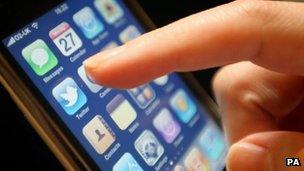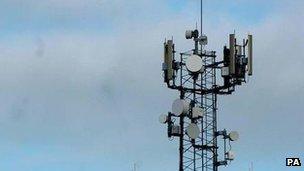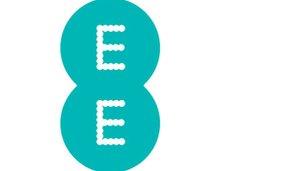Will the 4G mobile auction meet the £3.5bn target?
- Published

The results of the 4G auction will be known in February and March
The deadline has now passed for applications to take part in the auction of the UK's fourth generation (4G) mobile phone network spectrum. Will the process raise the government's £3.5bn target?
4G is being introduced to ultimately replace existing 3G coverage, and will give smartphone users faster data downloads.
While the EE mobile phone network (formed by the merger of Orange and T-Mobile) has already been able to launch 4G, the rest of the required frequency bands are now being made available.
Following the passing of Tuesday's deadline for applicants, the auction will start next month, with licences granted in February and March and services set to be launched in May and June.
All four of the current mobile phone networks are expected to participate in the auction - Vodafone, O2, Three and EE. Analysts say EE will take part so it can gain additional frequency bands to expand its 4G service.
No new entrants are expected because of the sky-high cost of setting up a new mobile phone network in the UK.
Varied estimates
James Barford, mobile analyst at Enders Analysis, said the auction may struggle to raise £3.5bn.
"Auctions are always very difficult to predict," he says.
"What I would say is that if you look at the European auctions of 4G and expect the same prices in the UK, ours should raise about £2.5bn.
"I wouldn't say £3.5bn is beyond the realms of possibility, but it is a little hard to see. It was the same mobile phone companies, or least their parent firms, who participated in the European auctions as will do so in the UK."
By contrast, Shaun Collins, chief executive of CCS Insight, which studies the mobile phone industry, said the auction could raise more than £3.5bn.
"At the end of the day, it is an auction, it has been structured to maximise the return to the government. So £3.5bn may be a little modest," he says.
The £3.5bn target figure originally came from the Office for Budget Responsibility, the agency set up by the government to independently monitor public sector finances.
Dan Worth, news editor of technology website V3 said it was "slightly odd" that George Osborne and the Treasury were publicly agreeing with this figure.
"The government should be wanting to make as much money as they can, with the operators caught in a bidding war. The government putting a figure on how much it wants to raise doesn't help do this."
Weaker market
One thing that is certain is that the final figure for how much the 4G auction makes will be nowhere near the £22bn raised from the auction of 3G back in 2000.

The frequencies up for grabs could mean the networks don't need as many transmitters
Mr Worth said: "The mobile phone network market is quite different now, it is not flushed with cash like it was in 2000."
Then the mobile phone market was in its infancy, and the networks were able to enjoy substantial rises in profits as many people bought mobile phones for the first time.
By contrast, the UK market is now saturated, and such big rises in profits are a thing of the past.
Mr Barford said: "Another thing pushing up bidding prices back in 2000 was the general assumption that the networks had to have 3G in order to continue being a mobile provider. Now there is the realisation that 4G isn't that much faster than the latest versions of 3G.
"Also, back in 2000 there were other companies trying to win licences, such as NTL. This stoked the bidding war."
'Better frequencies'
While the 4G auction is being portrayed as the ability of phone networks to offer customers a faster data service, there is another crucial, but lesser known, factor at play, and it concerns the frequency bands or spectrum up for grabs.

EE already offers a 4G service
It turns out that the frequencies being offered for 4G can travel a further distance than those currently being used for 3G. This should mean users get a stronger signal in rural areas, and also when they are inside large buildings.
Mr Barford said: "This spectrum issue is key, and it has nothing to do with 4G - you could equally run 3G over the frequencies being released.
"As these frequencies enable signals to travel further, it means the networks should be able to offer a stronger signal at less expense - they won't need as many transmitters.
"All the main networks can win space on this spectrum in the 4G auction, but the demand to do so could push up the price they are prepared to pay."
From the government's point of view, it must be hoping that the auction does hit the £3.5bn target because, as George Osborne admitted in the Autumn Statement, he has already started spending the projected windfall. He said he had earmarked the funds for new projects including numerous further education colleges.
However, a Treasury spokeswoman said that all spending decisions had to be seen with regard to wider government income.
She added: "Projected receipts from the 4G spectrum sale are, as with all forecasts of spending and revenue, verified independently by the Office for Budget Responsibility.
"Economic and fiscal policy decisions are rightly made on the basis of the judgements of the independent forecaster."
- Published5 December 2012
- Published20 November 2012
- Published12 November 2012
- Published2 October 2012